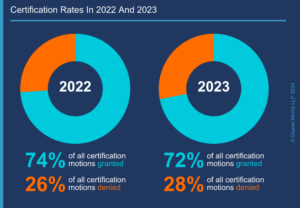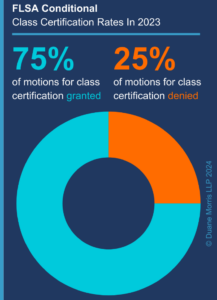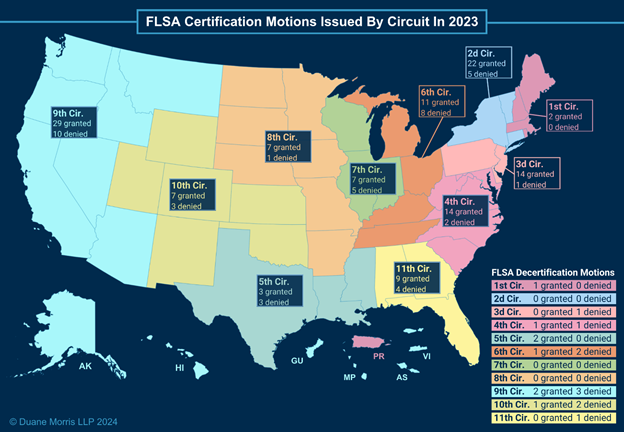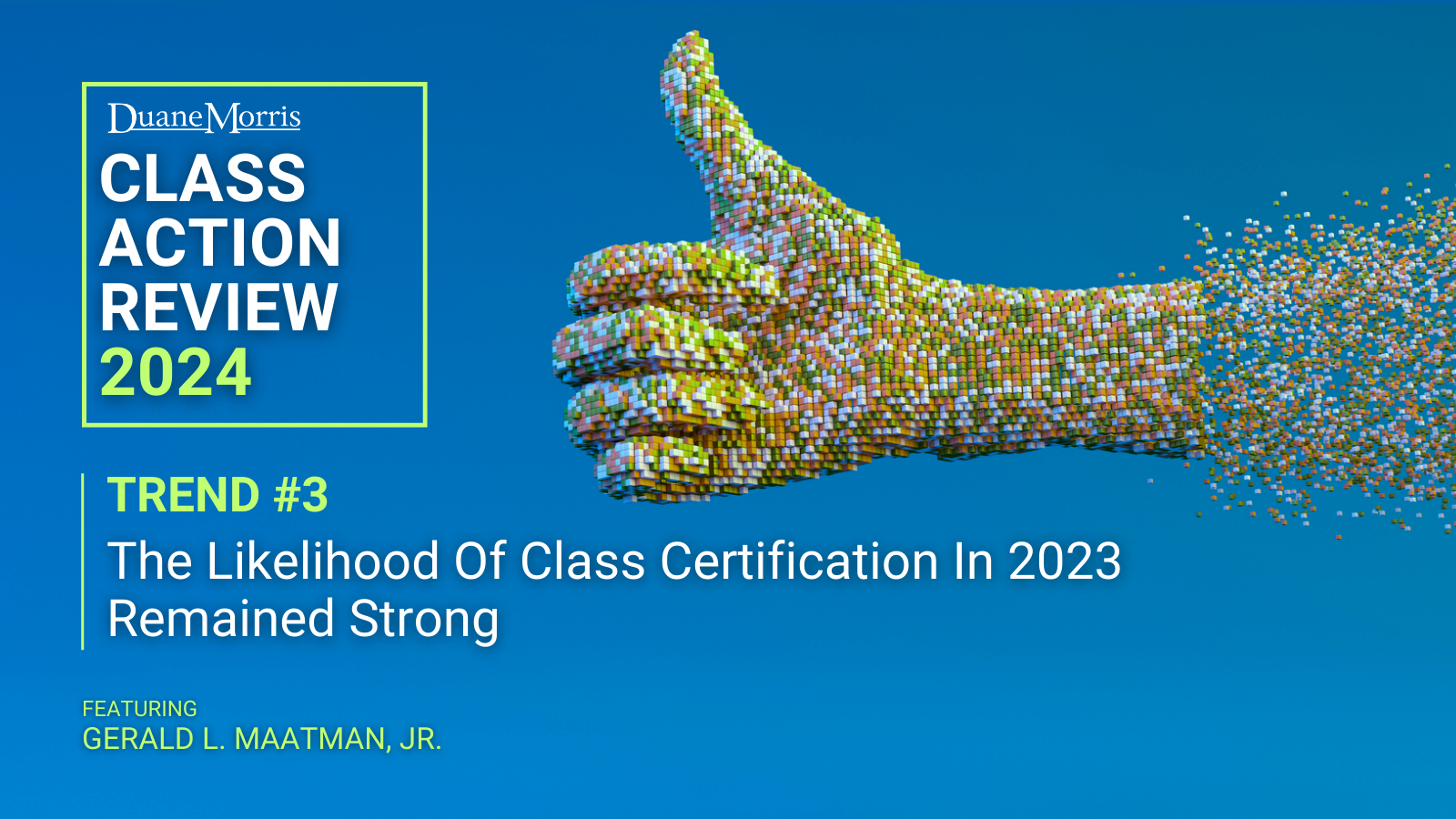
By Gerald L. Maatman, Jr. and Jennifer A. Riley
Duane Morris Takeaway: In 2023, the number of class certification rulings issued by courts eclipsed the numbers issued in recent years, and the overall rate of class certification remained high, as plaintiffs continued to succeed in certifying class actions at high rates. In 2023, the plaintiffs’ class action bar succeeded in certifying class actions at a high rate. Across all major types of class actions, courts issued rulings on 451 motions to grant or to deny class certification in 2023. Of these, plaintiffs succeeded in obtaining or maintaining certification in 324 rulings, an overall success rate of 72%.
Watch Duane Morris partner Jerry Maatman discuss the high certification rates in 2023 and what it means for 2024 in the video below:
Trend #3 – The Likelihood Of Class Certification In 2023 Remained Strong
The numbers show that, when compared to 2022, plaintiffs filed more motions for class certification in 2023, resulting in more certified class actions in 2023. Across all major types of class actions, courts issued rulings on 451 motions to grant or deny class certification, and plaintiffs succeeded in obtaining or maintaining certification in 324 rulings, with an overall success rate of 72%. In 2022, by comparison, courts issued rulings on 335 motions to grant or to deny class certification, and plaintiffs succeeded in obtaining or maintaining certification in 247 rulings, an overall success rate of nearly 74%.
In 2023, the number of motions that courts considered varied significantly by subject matter area, and the number of rulings varied across substantive areas. The following summarizes the results in each of ten key areas of class action litigation:
Securities Fraud – 97% granted / 3% denied (35 of 36 granted / 1 of 36 denied)
Data Breach – 14% granted / 86% denied (1 of 7 granted / 6 of 7 denied)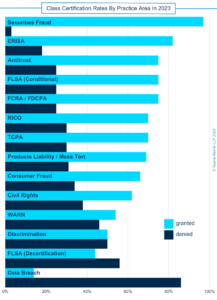
Discrimination – 50% granted / 40% denied (4 of 8 granted / 4 of 8 denied)
ERISA – 82% granted / 18% denied (41 of 50 granted / 9 of 50 denied)
FCRA / FDCPA – 75% granted / 25% denied (3 of 4 granted / 1 of 4 denied)
RICO – 70% granted / 30% denied (7 of 10 granted / 3 of 10 denied)
TCPA – 70% granted / 30% denied (7 of 10 granted / 3 of 10 denied)
WARN – 54% granted / 46% denied (7 of 13 granted / 6 of 13 denied)
FLSA (Conditional Certification) – 75% granted / 25% denied (125 of 167 granted / 42 of 167 denied)
FLSA (Decertification) – 44% granted / 56% denied (8 of 18 granted / 10 of 18 denied)
Antitrust – 75% granted / 25% denied (15 of 20 granted / 5 of 20 denied)
Products Liability / Mass Torts – 69% granted / 31% denied (9 of 13 granted / 4 of 13 denied)
Civil Rights – 62% granted / 38% denied (30 of 48 granted / 18 of 48 denied)
Consumer Fraud – 66% granted / 34% denied (38 of 58 granted / 20 of 58 denied).
The plaintiffs’ class action bar obtained the highest rates of success in securities fraud, antitrust, FLSA, and ERISA actions. In cases alleging securities fraud, plaintiffs succeeded in obtaining orders certifying classes in 35 of the 36 rulings issued during 2023, a success rate of 97%. In antitrust litigation, plaintiffs succeeded in obtaining orders certifying classes in 15 of 20 rulings issued during 2023, a success rate of 75%. In cases alleging ERISA violations, plaintiffs succeeded in obtaining orders certifying classes in 41 of 50 rulings, for a success rate of 82%. And in cases alleging FLSA violations, plaintiffs managed to obtain first-stage certification rulings in 125 of 167 rulings issued during 2023, a success rate of nearly 75%.
As additional judicial nominations emanate from the White House to fill open slots in federal courts, we can expect the makeup of the judiciary to continue to evolve toward the left during the upcoming year, thereby reducing the likelihood we will see any significant shift in this trend.
Courts Issued More Rulings In FLSA Collective Actions Than In Any Other Areas Of Law
In 2023, courts again issued more certification rulings in FLSA collective actions than in other types of cases. Plaintiffs historically have been able to obtain conditional certification of FLSA collective actions at a high rate, which surely has contributed to the number of filings in this area.
In 2023, courts considered more motions for certification in FLSA matters than in any other substantive area. Overall, courts issued 183 rulings. Of these, 165 addressed first-stage motions for conditional certification of collective actions under 29 U.S.C. § 216(b), and 18 addressed second-stage motions for decertification of collective actions. Of the 167 rulings that courts issued on motions for conditional certification, 125 rulings favored plaintiffs, for a success rate of nearly 75%.
These numbers are lower than the numbers observed in 2022, during which courts issued 236 rulings. Of these, 219 addressed first-stage motions for conditional certification of collective actions under 29 U.S.C. § 216(b), and 18 addressed second-stage motions for decertification of collective actions. Of the 219 rulings that courts issued on motions for conditional certification, 180 rulings favored plaintiffs, for a success rate of 82%. Such rate was in line with and slightly higher than the historic rate of success that plaintiffs have achieved with respect to such motions.
The decline in success rates in 2023 likely reflects the impact of courts in certain federal circuits more closely scrutinizing motions for conditional certification. Until recently, courts almost universally applied a two-step process to certification of FLSA collective actions.
At the first stage, courts applied a lenient burden such that they required a plaintiff to make only a “modest factual showing” that he or she was similarly situated to others, and plaintiffs often met such burden by submitting declarations from a limited number of potential collective action members.
At the second stage, courts conducted a more thorough examination of the evidence to determine whether in fact the plaintiff was similarly situated to those he or she sought to represent such that the matter should proceed to trial on a representative basis.
Recently, however, federal appellate courts in two circuits – the Fifth Circuit and Sixth Circuit — took a closer look at the so-called two-step process. In 2021, the Fifth Circuit in Swales v. KLLM Transport Services, LLC, 985 F.3d 430, 436 (5th Cir. 2021), rejected the two-step approach to evaluating collective action certification, holding instead that district courts must “rigorously scrutinize the realm of ‘similarly situated’ workers … at the outset of the case.”
This past year, in 2023, the Sixth Circuit joined the Fifth Circuit in jettisoning the traditional two-step approach.
In Clark, et al. v. A&L Homecare & Training Center, LLC, 68 F.4th 1003 (6th Cir. 2023), the Sixth Circuit rejected the traditional two-step approach, but expressly declined to adopt the standard approved by the Fifth Circuit. Instead, the Sixth Circuit introduced a new standard that focuses on whether the plaintiff has demonstrated a “strong likelihood” that other employees he or she seeks to represent are “similarly situated” to the plaintiff.
As these new, stricter standards in the Fifth and Sixth Circuits take hold, we are likely to see success rates normalize as plaintiffs shift their case filings away from these two circuits toward jurisdictions with more lenient, more plaintiff-friendly standards for conditional certification.
Indeed, the success rate for plaintiffs in the Fifth Circuit declined by a noticeable amount in 2023, likely as a trickle-down effect of Swales.
In 2022, courts in the Fifth Circuit issued 7 rulings on motions for conditional certification, and plaintiffs prevailed in 5, or 71%. In 2023, courts in the Fifth Circuit issued 6 rulings on motion for conditional certification, and plaintiffs prevailed in 3, or 50%.
At the decertification stage, courts generally have conducted a closer examination of the evidence and, as a result, defendants historically have enjoyed an equal if not higher rate of success on these second-stage motions as compared to plaintiffs.
The results in 2023 were no exception.
Of the 18 rulings that courts issued on motions for decertification of collective actions, 8 rulings favored defendants, for a success rate of 44%. Such rate aligns with the success rate defendants enjoyed in 2022, and aligns with the historic rate of success that defendants have achieved at the decertification stage.
An analysis of these rulings demonstrates that a disproportionate number emanated from traditionally pro-plaintiff jurisdictions, including the judicial districts within the Second Circuit (27 decisions) and Ninth Circuit (44 decisions), which include New York and California, respectively.
Similar to recent years, however, the number of rulings emanating from the Sixth Circuit (22 decisions) proved nearly as high if not higher than the number of rulings in the traditional pro-plaintiff forums, a trend that, as mentioned above, is likely to reverse as we start to see the impact of Clark and plaintiffs begin shifting their filings toward other jurisdictions.
The following map illustrates these variations:
The numbers no doubt flow from the different standards and approaches that courts in different federal circuits take in evaluating motions for conditional certification and decertification and, in turn, the likelihood of plaintiffs’ success on such motions. If more courts join the Fifth and Sixth Circuits in abandoning the traditional two-step certification process, and thereby increase the time and expense of gaining a conditional certification order, it may lead to a reshuffling of the deck in terms of where plaintiffs file their cases and the types of claims they pursue.

